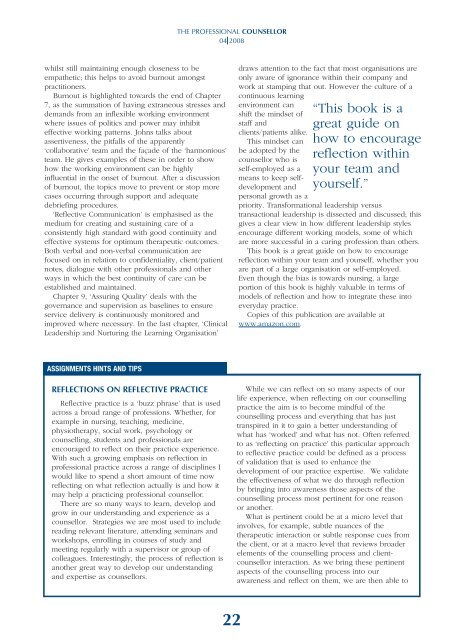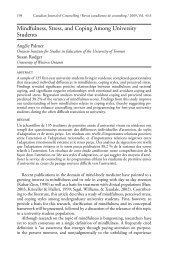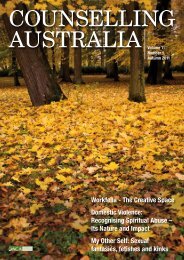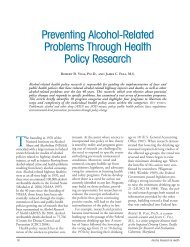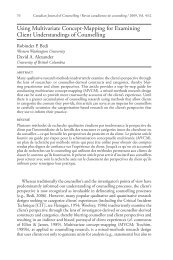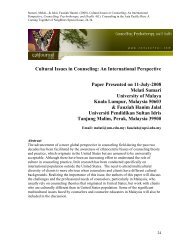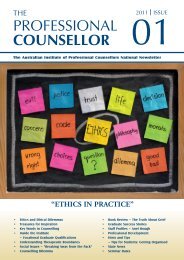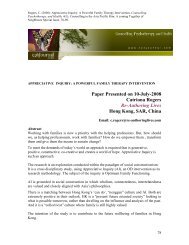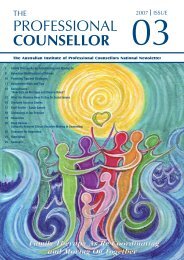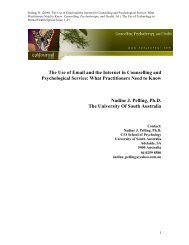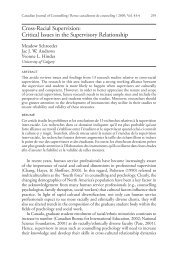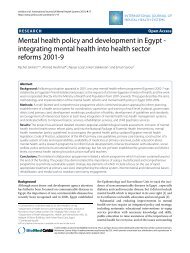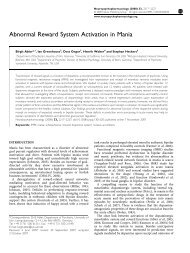Counselling Practice - Becoming a Reflective Practitioner
Counselling Practice - Becoming a Reflective Practitioner
Counselling Practice - Becoming a Reflective Practitioner
Create successful ePaper yourself
Turn your PDF publications into a flip-book with our unique Google optimized e-Paper software.
THE PROFESSIONAL COUNSELLOR<br />
04 2008<br />
whilst still maintaining enough closeness to be<br />
empathetic; this helps to avoid burnout amongst<br />
practitioners.<br />
Burnout is highlighted towards the end of Chapter<br />
7, as the summation of having extraneous stresses and<br />
demands from an inflexible working environment<br />
where issues of politics and power may inhibit<br />
effective working patterns. Johns talks about<br />
assertiveness, the pitfalls of the apparently<br />
‘collaborative’ team and the façade of the ‘harmonious’<br />
team. He gives examples of these in order to show<br />
how the working environment can be highly<br />
influential in the onset of burnout. After a discussion<br />
of burnout, the topics move to prevent or stop more<br />
cases occurring through support and adequate<br />
debriefing procedures.<br />
‘<strong>Reflective</strong> Communication’ is emphasised as the<br />
medium for creating and sustaining care of a<br />
consistently high standard with good continuity and<br />
effective systems for optimum therapeutic outcomes.<br />
Both verbal and non-verbal communication are<br />
focused on in relation to confidentiality, client/patient<br />
notes, dialogue with other professionals and other<br />
ways in which the best continuity of care can be<br />
established and maintained.<br />
Chapter 9, ‘Assuring Quality’ deals with the<br />
governance and supervision as baselines to ensure<br />
service delivery is continuously monitored and<br />
improved where necessary. In the last chapter, ‘Clinical<br />
Leadership and Nurturing the Learning Organisation’<br />
draws attention to the fact that most organisations are<br />
only aware of ignorance within their company and<br />
work at stamping that out. However the culture of a<br />
continuous learning<br />
environment can<br />
shift the mindset of<br />
staff and<br />
clients/patients alike.<br />
This mindset can<br />
be adopted by the<br />
counsellor who is<br />
self-employed as a<br />
means to keep selfdevelopment<br />
and<br />
personal growth as a<br />
“This book is a<br />
great guide on<br />
how to encourage<br />
reflection within<br />
your team and<br />
yourself.”<br />
priority. Transformational leadership versus<br />
transactional leadership is dissected and discussed; this<br />
gives a clear view in how different leadership styles<br />
encourage different working models, some of which<br />
are more successful in a caring profession than others.<br />
This book is a great guide on how to encourage<br />
reflection within your team and yourself, whether you<br />
are part of a large organisation or self-employed.<br />
Even though the bias is towards nursing, a large<br />
portion of this book is highly valuable in terms of<br />
models of reflection and how to integrate these into<br />
everyday practice.<br />
Copies of this publication are available at<br />
www.amazon.com.<br />
ASSIGNMENTS HINTS AND TIPS<br />
REFLECTIONS ON REFLECTIVE PRACTICE<br />
<strong>Reflective</strong> practice is a ‘buzz phrase’ that is used<br />
across a broad range of professions. Whether, for<br />
example in nursing, teaching, medicine,<br />
physiotherapy, social work, psychology or<br />
counselling, students and professionals are<br />
encouraged to reflect on their practice experience.<br />
With such a growing emphasis on reflection in<br />
professional practice across a range of disciplines I<br />
would like to spend a short amount of time now<br />
reflecting on what reflection actually is and how it<br />
may help a practicing professional counsellor.<br />
There are so many ways to learn, develop and<br />
grow in our understanding and experience as a<br />
counsellor. Strategies we are most used to include<br />
reading relevant literature, attending seminars and<br />
workshops, enrolling in courses of study and<br />
meeting regularly with a supervisor or group of<br />
colleagues. Interestingly, the process of reflection is<br />
another great way to develop our understanding<br />
and expertise as counsellors.<br />
While we can reflect on so many aspects of our<br />
life experience, when reflecting on our counselling<br />
practice the aim is to become mindful of the<br />
counselling process and everything that has just<br />
transpired in it to gain a better understanding of<br />
what has ‘worked’ and what has not. Often referred<br />
to as ‘reflecting on practice’ this particular approach<br />
to reflective practice could be defined as a process<br />
of validation that is used to enhance the<br />
development of our practice expertise. We validate<br />
the effectiveness of what we do through reflection<br />
by bringing into awareness those aspects of the<br />
counselling process most pertinent for one reason<br />
or another.<br />
What is pertinent could be at a micro level that<br />
involves, for example, subtle nuances of the<br />
therapeutic interaction or subtle response cues from<br />
the client, or at a macro level that reviews broader<br />
elements of the counselling process and clientcounsellor<br />
interaction. As we bring these pertinent<br />
aspects of the counselling process into our<br />
awareness and reflect on them, we are then able to<br />
22


